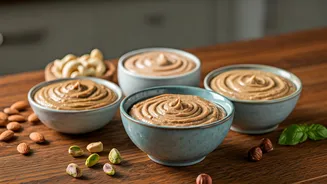Oats: Morning Armour
Oats, a breakfast staple, are packed with soluble fiber, specifically beta-glucan. This fiber helps reduce LDL (bad) cholesterol levels. Beta-glucan forms
a gel in the digestive system, which traps cholesterol and prevents its absorption. A bowl of oatmeal, perhaps with a sprinkle of berries and nuts, provides a nutritious start to the day. Adding oats to your diet is easy; try them in smoothies, as a topping for yogurt, or in baked goods. Oats' versatility and health benefits make them a cornerstone of a heart-healthy diet. Remember, consistency is critical, so include oats regularly for optimal cholesterol management. Choosing whole grain oats over instant varieties offers the greatest fiber content, further supporting the heart's health and helping you feel full longer.
Avocado: Creamy Hero
Avocados are rich in monounsaturated fats, which are beneficial for heart health. They can help lower LDL cholesterol while increasing HDL (good) cholesterol levels. Incorporating avocados into your diet is a delicious and simple way to support heart health. You can slice them on toast, add them to salads, or blend them into smoothies. The creamy texture of avocados also makes them a satisfying substitute for unhealthy fats. Their high fiber content further aids in lowering cholesterol, as fiber helps bind cholesterol in the digestive tract. Consider using avocado in place of mayonnaise or butter for a healthier alternative. The versatility of avocados makes them a great addition to any meal plan, offering both taste and significant health benefits.
Flaxseeds: Tiny Giants
Flaxseeds are nutritional powerhouses, particularly rich in omega-3 fatty acids and soluble fiber. These components help reduce LDL cholesterol and improve overall heart health. Omega-3s have been shown to reduce inflammation, which can contribute to heart disease. The fiber content of flaxseeds also aids in cholesterol management. To integrate flaxseeds into your diet, add them to your morning cereal, blend them into smoothies, or sprinkle them on salads. Ground flaxseeds are easier for the body to digest and absorb the nutrients. Using flaxseed oil in dressings or drizzling it over cooked vegetables is another convenient way to include flaxseeds in your diet. Start with a small amount and gradually increase your intake.
Beans/Lentils: Humble Power
Beans and lentils are packed with soluble fiber, making them excellent choices for lowering cholesterol. They bind with cholesterol in the digestive tract and prevent its absorption. These legumes also offer a wealth of other nutrients, including protein, vitamins, and minerals. Incorporating beans and lentils into your diet is versatile. You can add them to soups, stews, salads, or as a side dish. They are also relatively inexpensive and easy to prepare. Regular consumption of beans and lentils can contribute significantly to a heart-healthy diet. Explore various recipes to find your favorite ways to include these nutritional powerhouses. Experiment with different types of beans and lentils, like kidney beans, chickpeas, or black lentils.
Garlic: Heart’s Friend
Garlic has been shown to reduce total cholesterol and LDL cholesterol levels. It contains allicin, a compound with potent antioxidant and anti-inflammatory properties, promoting cardiovascular health. Garlic can be added to various dishes to enhance flavor and boost health benefits. It is a fantastic addition to stir-fries, sauces, and roasted vegetables. Using fresh garlic is generally recommended, as it contains higher levels of allicin compared to garlic powder. Incorporating garlic into your diet is a simple yet effective way to support your heart health. If you are not a fan of the taste of raw garlic, consider cooking it to mellow its flavor. Even a small amount of garlic added regularly can offer positive effects.
Green Tea: Sip Goodness
Green tea contains antioxidants, particularly catechins, which help lower LDL cholesterol levels and improve overall heart health. Catechins protect against the oxidation of LDL cholesterol, a process that can contribute to heart disease. Drinking green tea regularly can offer significant benefits. Brewing it fresh from loose leaves can maximize its antioxidant content, although tea bags are also a convenient option. You can enjoy green tea hot or cold. Opting for unsweetened green tea is best to avoid adding extra sugars. Its mild flavor makes it easy to incorporate into your daily routine. Experiment with different types of green tea, such as matcha, for added health benefits.
Amla: Detox Delight
Amla, also known as Indian gooseberry, is rich in Vitamin C and antioxidants that help lower cholesterol. These compounds work to reduce LDL cholesterol levels and prevent the oxidation of cholesterol, reducing the risk of heart disease. The antioxidants in amla protect blood vessels from damage and promote cardiovascular health. Amla can be consumed in various forms, including fresh fruit, juice, powder, or supplements. Amla juice, for example, is a refreshing drink with substantial health benefits. Consider adding amla powder to smoothies or other dishes. While amla is highly beneficial, consult your healthcare provider to ensure it's suitable for your health needs.



















